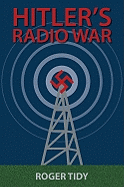Not only am I a long-time radio enthusiast, but I’m also something of a history buff—I have a particular affection for WWII era radios, often experiencing virtual time travel while listening to, for example, my Hallicrafter’s SX-24, or my father’s RCA console radio.
 I suppose that’s why I was so intrigued to receive a review copy of Hitler’s Radio War by Roger Tidy. Although I know quite a bit of WWII history, I knew relatively little about Hitler’s radio propaganda machine, which Tidy describes in detail in this recent work.
I suppose that’s why I was so intrigued to receive a review copy of Hitler’s Radio War by Roger Tidy. Although I know quite a bit of WWII history, I knew relatively little about Hitler’s radio propaganda machine, which Tidy describes in detail in this recent work.
Hitler’s Radio War (Robert Hale, publisher, 2011) is a comprehensive history of the multi-language, insidious Third Reich initiative to brainwash their perceived antagonists, both prior to and in the aftermath of each invasion.
Tidy’s complex and multi-faceted history unfolds in a very logical and deliberate manner. By placing his emphasis on the broadcasters, or radio talent, Tidy also presents a history of traitors, misguided expatriates, and political opportunists. Personalities such as the infamous Lord Haw Haw and Axis Sally (although there are actually two Sallies, as Tidy reveals) often had a passion for political change or their own self-centered achievement, and allegiances which were known to shift with the wind. Tidy describes how the Third Reich’s Gestapo became particularly adept at hunting this type of personality and turning any discovered talent into the “friendly” voice of Fascism.
Tidy’s comprehensive radio history is made particularly relevant to radio enthusiasts like myself in a number of ways. For example, his text frequently includes large sections of original broadcast transcripts, most fascinating in their revelation of the seductively crafted politicism of Hitler’s war machine. And Tidy’s mention of stations quite often includes specifics such as:
- frequency information (i.e., the meter band),
- a description of the interval signal or theme, and
- the geographical transmission sites of broadcasts, particularly useful in understanding their efficacy.
It is clear that Tidy has spent a great deal of time conducting original research in BBC monitoring archives and listening to recordings of many of these broadcasts first-hand, which significantly enriches his work.
In short, I found Hitler’s Radio War an insightful, thought-provoking, and enjoyable account of WWII radio history. Also of particular interest to current-day radio listeners, Tidy’s book describes the birth of large government international broadcasters, many of which are still on the air today–namely, Voice of America, Radio Free Europe, Radio Free Asia, and the like.
Many thanks to Roger Tidy for writing this fascinating history with radio listeners in mind.
